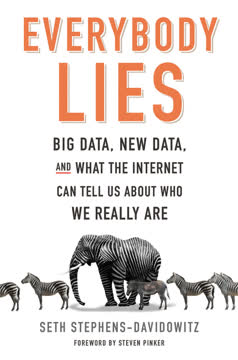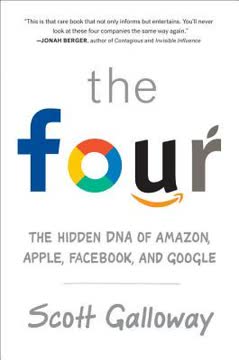Key Takeaways
1. The Four Horsemen: Amazon, Apple, Facebook, and Google dominate the digital landscape
Over the last twenty years, four technology giants have inspired more joy, connections, prosperity, and discovery than any entity in history.
The Four Horsemen have reshaped the global economy and our daily lives. These companies have created unprecedented wealth, with a combined market value of $2.3 trillion, while providing services used by billions of people worldwide. Their influence extends beyond technology, affecting industries ranging from retail to advertising to entertainment.
Key characteristics of the Four:
- Massive user bases (billions of users)
- Dominant market positions in their respective fields
- Ability to disrupt traditional industries
- Access to vast amounts of user data
- Strong brand loyalty and cultural influence
Despite their positive contributions, the Four also face criticism for issues such as:
- Tax avoidance
- Privacy concerns
- Job displacement
- Monopolistic practices
2. Amazon: The everything store revolutionizing retail and cloud computing
Amazon eases the pain of drudgery—getting the stuff you need to survive.
Amazon's core competencies are logistics and cloud computing. The company has revolutionized retail by offering unparalleled selection, competitive pricing, and fast delivery. Amazon Prime, its subscription service, has become a cornerstone of the business, with over 100 million members worldwide.
Key aspects of Amazon's success:
- Relentless focus on customer experience
- Massive investment in fulfillment infrastructure
- Diversification into cloud computing (AWS)
- Willingness to operate at low margins for long-term growth
- Acquisition of complementary businesses (e.g., Whole Foods)
Amazon's impact extends beyond retail, with AWS dominating the cloud computing market and the company exploring new areas such as healthcare and autonomous delivery.
3. Apple: From computers to luxury lifestyle brand
At its core, Apple fills two instinctual needs: to feel closer to God and be more attractive to the opposite sex.
Apple's transformation from a computer company to a luxury lifestyle brand has been pivotal to its success. By focusing on design, user experience, and brand image, Apple has created a devoted customer base willing to pay premium prices for its products.
Key elements of Apple's strategy:
- Emphasis on design and user experience
- Vertical integration (hardware, software, and services)
- Creation of a strong ecosystem (iPhone, iPad, Mac, Apple Watch)
- Expansion into services (Apple Music, Apple Pay, App Store)
- Retail stores as brand showcases
Apple's ability to command high margins and create emotional connections with customers has made it one of the most valuable companies in history.
4. Facebook: Connecting the world and monetizing personal data
Facebook is the world's connective tissue: a combination of our behavioral data and ad revenue that underwrites a Google-like behemoth.
Facebook's core product is its social network, which connects billions of people worldwide. The company has leveraged its massive user base to build a powerful advertising platform, allowing businesses to target users with unprecedented precision.
Key aspects of Facebook's business model:
- Network effects driving user growth
- Detailed user data enabling targeted advertising
- Expansion through acquisitions (Instagram, WhatsApp)
- Development of new technologies (virtual reality, cryptocurrency)
- Focus on user engagement and time spent on platform
Facebook's dominance in social media has raised concerns about privacy, misinformation, and the company's impact on society and democracy.
5. Google: The modern-day god of information and advertising
Google is a modern man's god. It's our source of knowledge—ever-present, aware of our deepest secrets, reassuring us where we are and where we need to go, answering questions from trivial to profound.
Google's core business is organizing the world's information and making it accessible. The company's search engine has become an essential tool for billions of people, while its advertising platform, Google Ads, dominates the digital advertising market.
Key components of Google's success:
- Superior search algorithm and user experience
- Vast amounts of user data enabling targeted advertising
- Expansion into mobile operating systems (Android)
- Development of cloud services and productivity tools
- Investment in emerging technologies (AI, self-driving cars)
Google's influence extends beyond search and advertising, with the company playing a significant role in shaping the future of technology and information access.
6. The Four's strategies: Stealing IP, protecting assets, and exploiting data
Stealing is a core competence of high-growth tech firms.
The Four have employed various strategies to achieve and maintain their dominance. These include:
- Intellectual property acquisition:
- Copying and improving upon existing technologies
- Acquiring promising startups and integrating their innovations
- Protecting assets:
- Aggressively defending patents and trademarks
- Creating walled gardens and ecosystems to lock in users
- Data exploitation:
- Collecting vast amounts of user data
- Using AI and machine learning to derive insights and improve services
- Regulatory arbitrage:
- Exploiting legal loopholes to avoid taxes and regulations
- Lobbying for favorable policies and legislation
These strategies have allowed the Four to maintain their competitive edge and continue growing at a rapid pace.
7. The impact of the Four: Job destruction, wealth concentration, and societal implications
America is on pace to be home to 3 million lords and 350 million serfs.
The rise of the Four has led to significant economic and social consequences. While these companies have created enormous value, they have also contributed to growing inequality and job displacement.
Key impacts of the Four:
- Job destruction in traditional industries (retail, media, etc.)
- Concentration of wealth among a small group of tech elites
- Erosion of privacy and increased data collection
- Disruption of traditional business models and industries
- Influence on public discourse and democracy
The Four's ability to create value with relatively few employees has led to concerns about the future of work and the distribution of wealth in society.
8. Competing with the Four: Differentiation, visionary capital, and global reach
Product differentiation, visionary capital, global reach, likability, vertical integration, AI, accelerant, and geography.
To compete with the Four, companies must focus on several key factors:
- Product differentiation: Offering unique value propositions
- Visionary capital: Attracting investment through compelling storytelling
- Global reach: Expanding beyond local markets
- Likability: Building positive brand perception
- Vertical integration: Controlling the entire value chain
- AI and data: Leveraging technology and user information
- Accelerant: Attracting top talent and fostering innovation
- Geography: Proximity to world-class universities and talent pools
Companies that excel in these areas may have a chance to challenge the Four or carve out successful niches in the digital economy.
9. Career strategies in the age of the Four: Emotional maturity, curiosity, and ownership
Follow your talent, not your passion.
To succeed in the digital age, individuals should focus on developing key skills and attributes:
- Emotional maturity: Ability to handle stress and work well with others
- Curiosity: Willingness to learn and adapt to new technologies
- Ownership: Taking responsibility for projects and outcomes
- Continuous learning: Staying updated on industry trends and skills
- Networking: Building relationships within and outside your organization
Additional career strategies:
- Pursue education at prestigious institutions
- Seek opportunities in growing industries and companies
- Develop a personal brand and online presence
- Embrace entrepreneurship or intrapreneurship
- Focus on areas where human skills complement AI and automation
10. The future after the Four: Potential successors and societal challenges
It's never been a better time to be exceptional, or a worse time to be average.
The digital landscape will continue to evolve, with potential challengers to the Four emerging and new technologies reshaping industries. Possible contenders include:
- Alibaba: China's e-commerce giant with global ambitions
- Tesla: Revolutionizing transportation and energy
- Uber: Disrupting transportation and logistics
- Microsoft: Resurgent tech giant with cloud and AI focus
Societal challenges to address:
- Wealth inequality and job displacement
- Data privacy and security
- Regulation of tech giants
- Ethical use of AI and automation
- Ensuring fair competition and innovation
As technology continues to advance, it is crucial to consider the broader implications for society and work towards solutions that balance innovation with social responsibility.
Last updated:
FAQ
What's The Four: The Hidden DNA of Amazon, Apple, Facebook, and Google about?
- Focus on Tech Giants: The book explores the influence and strategies of Amazon, Apple, Facebook, and Google, highlighting their dominance in the tech industry.
- Dual Narratives: It presents two contrasting views—one celebrating their societal contributions and another critiquing their monopolistic practices.
- Cultural and Economic Impact: Scott Galloway argues that these companies have reshaped the economy and daily life, raising questions about their power and the future of business.
Why should I read The Four by Scott Galloway?
- Insightful Analysis: Galloway provides a deep dive into the operations of these companies and the psychological instincts they exploit for success.
- Understanding Modern Business: The book offers lessons for navigating the digital economy and understanding consumer behavior.
- Cultural Commentary: It critiques the tech industry, prompting readers to consider the ethical implications of these companies' practices.
What are the key takeaways of The Four by Scott Galloway?
- Power Dynamics: The book emphasizes the unprecedented power these companies hold, likening them to "the Four Horsemen of the apocalypse."
- Consumer Instincts: Each company appeals to fundamental human instincts—Amazon to convenience, Apple to luxury, Facebook to connection, and Google to knowledge.
- Future Implications: Galloway speculates on the future of these companies and the potential emergence of a "Fifth Horseman."
What are the best quotes from The Four and what do they mean?
- "The Four are the most powerful entities in the history of mankind.": Highlights their immense influence over global economies and individual lives.
- "We willingly divulge personal updates, knowing they’ll be used for profit.": Reflects the paradox of trading privacy for convenience and connection.
- "Follow your talent, not your passion.": Encourages focusing on skills and market needs rather than merely pursuing passions.
How does Scott Galloway define the success of Amazon, Apple, Facebook, and Google in The Four?
- Exploiting Human Instincts: Each company taps into basic human instincts—Amazon with convenience, Apple with status, Facebook with connection, and Google with knowledge.
- Aggressive Growth Strategies: They take risks and invest heavily in infrastructure and technology to maintain competitive advantages.
- Cultural Relevance: These companies have embedded themselves into daily life, making their services indispensable.
What is the "T Algorithm" in The Four by Scott Galloway?
- Path to Trillion-Dollar Valuation: The "T Algorithm" outlines strategies and characteristics that enable a company to reach a trillion-dollar valuation.
- Key Components: Factors such as market dominance, consumer loyalty, and innovative business models are essential for success.
- Implications for Future Companies: Understanding the T Algorithm can help emerging companies strategize their growth and positioning.
What role do the Four Horsemen play in the economy according to The Four?
- Market Dominance: They create a monopoly-like environment, stifling competition and dictating terms to consumers and smaller businesses.
- Wealth Concentration: Their success leads to wealth concentration among a small group, exacerbating income inequality.
- Job Displacement: Automation and technology impact job markets, necessitating a reevaluation of workforce skills and education.
How does The Four address the issue of privacy and data collection?
- Data as a Commodity: The Four have turned personal data into a valuable commodity, often without full consumer understanding or consent.
- Regulatory Challenges: Regulators struggle to keep up with rapid technological evolution, raising the need for stronger privacy protections.
- Consumer Awareness: Galloway emphasizes the importance of consumer awareness regarding data collection practices.
What are the "sins" of the Four as described in The Four?
- Intellectual Property Theft: Accusations of stealing ideas and innovations from smaller firms to fuel growth.
- Exploitation of Data: Profiting from user data without adequate compensation or transparency, raising ethical questions.
- Market Manipulation: Using power to influence regulations and market conditions to their advantage.
How does Galloway suggest individuals can navigate the changes brought by the Four?
- Emphasize Emotional Intelligence: Emotional maturity and intelligence are crucial for success in a competitive environment.
- Continuous Learning and Adaptation: Lifelong learning and adaptability are essential skills in the modern job market.
- Focus on Personal Branding: Managing personal brand and online presence can significantly impact career opportunities.
What are the implications of the Four's dominance on traditional businesses?
- Increased Competition: Traditional businesses face pressure to adapt to the strategies of the Four.
- Need for Digital Transformation: Embracing digital transformation is crucial for survival, including adopting new technologies and improving customer experiences.
- Shift in Consumer Expectations: Businesses must meet heightened expectations regarding service, speed, and personalization.
How does The Four suggest the future might look for the tech giants?
- Potential for Disruption: While dominant, the Four could be challenged by new technologies or startups.
- Evolving Consumer Expectations: Consumers may demand more ethical practices and transparency, leading to operational changes.
- Continued Growth and Influence: Despite challenges, their ability to innovate and adapt will be crucial in maintaining market positions.
Review Summary
The Four receives mixed reviews, with some praising its insightful analysis of Amazon, Apple, Facebook, and Google's strategies and market dominance. Readers appreciate Galloway's direct writing style and humor. However, critics find the book disorganized, shallow, and overly focused on sex. Many note that while the information isn't entirely new, it provides a concise overview of these tech giants. The career advice section and author's self-promotion are divisive. Overall, readers find it an engaging, if flawed, examination of the four companies' power and influence.
Similar Books










Download PDF
Download EPUB
.epub digital book format is ideal for reading ebooks on phones, tablets, and e-readers.






